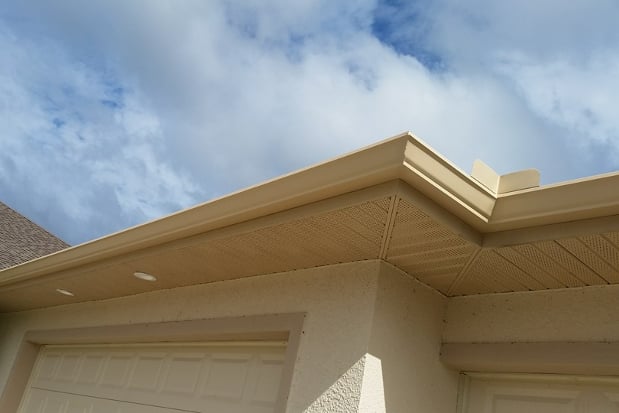
PVC gutters, also called vinyl gutters, are an interesting alternative to traditional guttering systems. Though you may not see them on a lot of houses, they’ve actually been around for about half a century. Originating in Scandinavia where temperatures run wild, from forty below in the winter to sixty above in the summer, they are built to withstand extreme weather conditions. Of course, this strength is important when it comes to any exterior installation, especially guttering which has to endure some serious rain and snowmelt. But since there is no such thing as a perfect product, even these tough vinyl systems come with a downside that you may need to consider before purchasing.
Long Live Vinyl
Once again, plastic is an extremely sturdy substance, which means it’s a perfect solution for outdoor situations. It’s water-resistant, so it’ll never rust, corrode, or tarnish. Plus, it’s still flexible, which means when you put up those Christmas lights, the ladder won’t dent, ding, or bend the material. Also, unlike metal units, PVC gutters are cast from a mold instead of being welded and painted over, which means scratches are invisible to the naked eye. And unlike metal, since these products are made from the same material inside and out, scrapes or other abrasions never lead to rotting or rusting.
Interesting Options
These guttering systems come in many shapes (standard 5″, 5″ half-round, etc.), and they can be molded in any color or shade to match your home’s exterior. Plus, they can sometimes be made from recycled products which help to conserve the environment. However, they only come in 10′ sections, and sometimes their untraditional appearance can turn off homeowners. But an interesting option on some models may make up for their looks: you’ll never have to get out that ladder again since many units can be cleaned from the ground. By hooking a long device from below, the troughs can be rotated on swivel brackets, allowing any sticks, leaves, or other debris to fall out. Of course, this is a great invention for occasional cleaning, but it’s still smart to inspect and rinse your guttering twice a year in order to get out the sticky mud and muck.
Ready to start your Vinyl Gutter Installation?
Find ProsDoing it Yourself
One of the benefits of PVC gutters is that they’re extremely inexpensive (about $3-5 per a section). This is a great economic advantage, but it does come with a downside: if something isn’t expensive, it may in fact be cheap. In other words, plastic can sometimes appear a little shoddy and low-end. Another immediate plus of plastic is that it’s very lightweight and therefore easy to install. This may be a do-it-youselfer’s dream since these units simply snap together, but it can also be a bit deceptive: though tough in many ways, if too thin, vinyl can also be a bit flimsy if you don’t choose the right product. So make sure you contact a service professional who’ll not only be able to help you choose the right thickness and dimensions, they’ll also guarantee a safe and secure installation.
PVC Gutter Repair
Once again, plastic is one tough puppy, but that doesn’t mean it’s indestructible. Just because it won’t dent or rust doesn’t mean it won’t age with time. Eventually, vinyl may become brittle and crack, especially in regions with cold winters. Also, rubber can harden at the joints and possibly expand and contract throughout the year. And, as in any guttering system, the sections may begin to sag, break, disconnect, or loosen at the seams. So though you may save money in the short term, the costs of occasional PVC gutter repair may set you back in the long run. Though the troubles are usually small and fixable, always address them as soon as possible in order to avoid exacerbation of the problems. So anytime you encounter a need for PVC gutter repair, never hesitate in calling a trained contractor for immediate help.
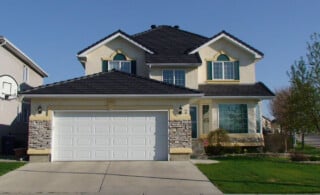 Rubber Roofing – Benefits & Alternatives
Rubber Roofing – Benefits & Alternatives 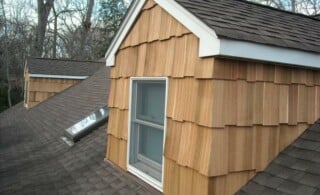 Should You Layer Shingles on Your Roof?
Should You Layer Shingles on Your Roof? 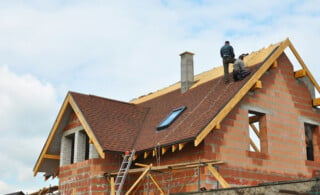 Are Dormers Right for Your Home? A Look at the Pros and Cons
Are Dormers Right for Your Home? A Look at the Pros and Cons  For Reduced Energy Costs, Try a Reflective Roof Coating
For Reduced Energy Costs, Try a Reflective Roof Coating 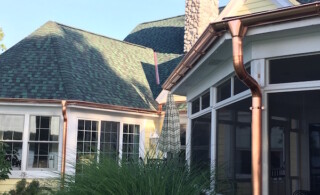 Copper Guttering: A Stylish Addition
Copper Guttering: A Stylish Addition 

Are You Familiar With This Topic? Share Your Experience.